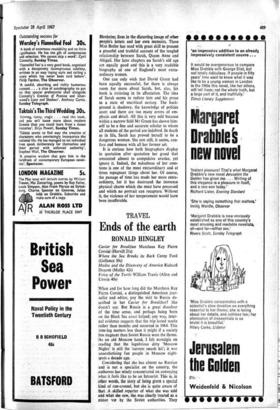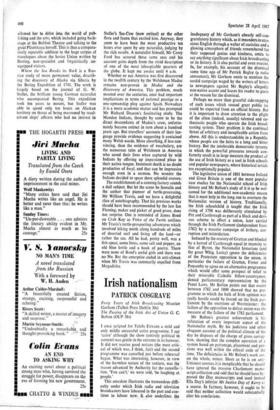TRAVEL
Ends of the earth
RONALD HINGLEY
Where the Sea Breaks its Back Corey Ford (Gollancz 30s)
Madoc and the Discovery of America Richard
Deacon (Muller 42s)
Voice of the Turtle William Travis (Allen and Unwin 40s) 'When and for how long did the Marchesa Ray Pierre Corsini, a distinguished American jour- nalist and editor, pay the visit to Russia de- scribed in her Caviar for Breakfast? She doesn't say. But Russia is a great dissolver of the time sense, and perhaps being born on the Black Sea coast helped; any way, inter- nal evidence suggests that the trip lasted weeks rather than months and occurred in 1964. This time-lag matters less than it might if a society less stagnant than Soviet Russia were the theme. As an old Moscow hand, I felt nostalgia on reading that the lugubrious ditty 'Moscow Nights' is still the 'current smash hit'; it was anaesthetising fun people in Moscow night- spots a decade ago.
Considering that she has almost no Russian and is not a specialist on the country, the authoress has wisely concentrated on conveying what it feels like to be an Intourist. This is, in other words, the story of being given a special kind of run-around, but she is quite aware of that. A skilled reporter of what she was told and what she saw, she was clearly treated as a minor vie by the Soviet authorities. They allowed her to delve into the world of pub- lishing and the arts; which included going back- stage at the Bolshoi Theatre and talking to the great Plisetskaya herself. This is thus a compara- tively reputable addition to the huge corpus of travelogues about the Soviet Union written by fleeting, non-specialist and linguistically un- equipped visitors.
Where the Sea Breaks its Back is a Rus- sian study of more permanent value, describ- ing the discovery of Alaska via Siberia by the Bering Expedition of 1741. The work is largely based on the journal of G. W. Steller, the brilliant young German naturalist who accompanied Bering. This expedition took ten years to mount, but Steller was able to spend only ten hours on Alaskan territory on threat of being marooned by recal- citrant ships' officers who had no interest in Steller's Sea-Cow (now extinct) or the other flora and fauna that excited him. Anyway, they seem to have been the most productive ten hours ever spent by any naturalist, judging by the rich results. A naturalist himself, Mr Corey Ford has scoured these same seas and his account gains depth from the vivid description of one of the most inhospitable quarters of the globe. It kept me awake until 4 a.m.
Whether or not America was first discovered in the twelfth century by the Welshman Madoc remains non-proven in Madoc and the Discovery of America. This problem, much mooted over the centuries, once had important implications in terms of national prestige as a one-upmanship ploy against Spain. Nowadays it is a more academic matter and has prompted Mr Richard Deacon's fascinating study. The Mandan Indians, thought by some to be the direct descendants of Madoc's crew, unfortu- nately became extinct in turn about a hundred years ago. But travellers' accounts of their lan- guage provide evidence suggesting it contained many Welsh words. More absorbing, if less con- vincing, than the evidence of vocabulary, are the numerous tales of Welshmen in America who saved their lives when captured by wild Indians by offering up impassioned pleas in their native tongue. Imminent death is no doubt productive of hwyl, and that can be impressive enough even in a sermon. No wonder the Indians decided to spare these splendid orators.
The establishment of a canning factory sounds a dull subject. But let the scene be Somalia and the author that pioneer of turtle-processing, Mr William Travis, and we have a delightful slice of autobiography. That his previous works should have been recommended by the late Ian Fleming, maker and picker of good prose, does not surprise. One is reminded of James Bond on Crab Key as Voice of the Turtle outlines Mr Travis's turtle-prospecting adventures which involved hiking north along hundreds of miles of deserted surf and living off the land—or rather the sea. All he had, pretty well, was a fish-spear, some limes, some salt and pepper, an old blue kettle and a book of poetry. There were none of Bond's awful girls and there was no No. But the enterprise ended in anti-climax when Mr Travis was summarily expelled from Mogadishu.







































 Previous page
Previous page